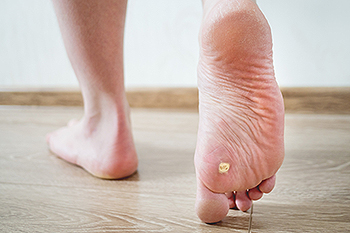
Plantar warts appear on the bottom of the foot. They grow inward as a result of the constant pressure that is exerted on the feet from standing and walking. They are caused by HPV, human papillomavirus, and can enter the body through small cuts in the feet. It is suggested to wear appropriate shoes while in public swimming areas and locker rooms, as this may prevent the spread of the virus. A plantar wart looks like a small area of hardened skin, and it generally has tiny black dots in the center. These are small, clotted blood vessels that are referred to as wart seeds. This type of wart generally causes severe pain and discomfort, and it may be difficult to walk. Patients who have a compromised immune system, in addition to people who are diabetic, may be prone to getting plantar warts. It is suggested that if you have a plantar wart to speak with a podiatrist who can guide you toward the best treatment methods.
Plantar warts can be very uncomfortable. If you need your feet checked, contact Howard Kimmel, DPM from Buckeye Foot Care. Our doctor will assist you with all of your foot and ankle needs.
About Plantar Warts
Plantar warts are the result of HPV, or human papillomavirus, getting into open wounds on the feet. They are mostly found on the heels or balls of the feet.
While plantar warts are generally harmless, those experiencing excessive pain or those suffering from diabetes or a compromised immune system require immediate medical care. Plantar warts are easily diagnosed, usually through scraping off a bit of rough skin or by getting a biopsy.
Symptoms
- Lesions on the bottom of your feet, usually rough and grainy
- Hard or thick callused spots
- Wart seeds, which are small clotted blood vessels that look like little black spots
- Pain, discomfort, or tenderness of your feet when walking or standing
Treatment
- Freezing
- Electric tool removal
- Laser Treatment
- Topical Creams (prescription only)
- Over-the-counter medications
To help prevent developing plantar warts, avoid walking barefoot over abrasive surfaces that can cause cuts or wounds for HPV to get into. Avoiding direct contact with other warts, as well as not picking or rubbing existing warts, can help prevent the further spread of plantar warts. However, if you think you have developed plantar warts, speak to your podiatrist. He or she can diagnose the warts on your feet and recommend the appropriate treatment options.
If you have any questions please feel free to contact one of our offices located in Brook Park and Willoughby, OH . We offer the newest diagnostic and treatment technologies for all your foot and ankle needs.
